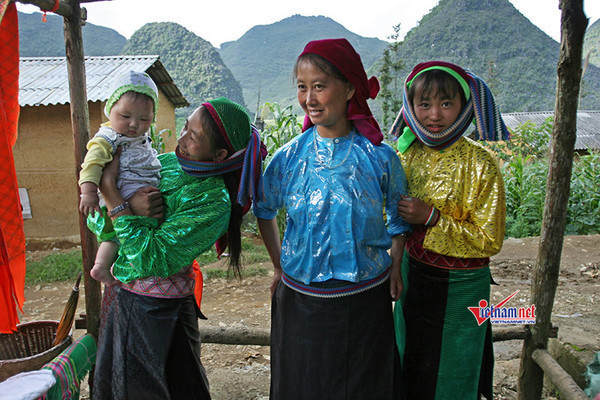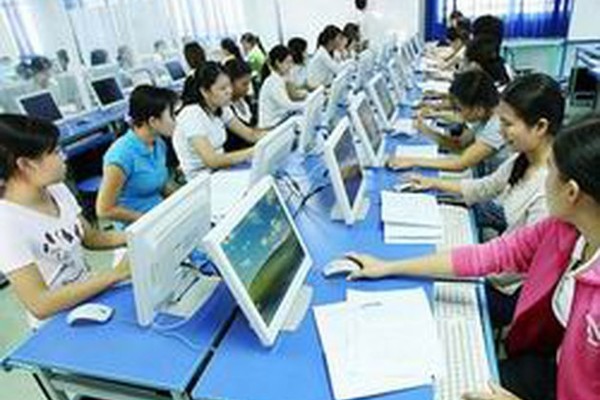In the field of economic rights, this year's report focuses on demonstrating achievements in hunger eradication, poverty reduction and social security.
In the field of political civil rights, the report made clear that Vietnam always respects the rights of freedom of speech, press and access to information, especially with information on the internet and electronic networks; religious life is protected and helped by the Vietnamese State.
Ensuring social security
Looking back at 2019, the global economy and trade declined, but Vietnam's economy continued to grow rapidly, reaching over 7%, higher than the plan (6.6-6.8%), belonging to the group of the country with the highest growth rate in the region and in the world; raising the country’s GDP to about $266 billion, an average of nearly $2,800 per person, which has never happened in the history of the country.
The Party and the State regard social development, ensuring better social security and social welfare as an important task, in the direction of "Building a diverse, effective and increasingly open social security system to better meet the requirements of all strata in the society, especially the social policy beneficiary and poor groups”.
In 2019, the percentage of poor households according to the new standards reduced to about 4%, 1% lower than in 2018; the health insurance coverage rate was over 90%; more than 54% of communes met the new rural standards, fulfilling the goal 2 years earlier than planned.
Ensuring civil and political rights
 |
|
“Respecting the care for happiness and the comprehensive development of human beings, protecting and ensuring the legitimate rights and interests, respecting and implementing international human rights treaties that Vietnam has signed".
|
In 2019, the United Nations Human Rights Commission held a meeting to review Vietnam's Third National Report on the implementation of the International Covenant on Civil and Political Rights (ICCPR).
At the meeting, the Vietnamese inter-ministerial delegation shared encouraging achievements in the protection and promotion of civil and political rights in Vietnam in recent years, and also provided more specific information to enable the UN Human Rights Commission members to understand clearly about the implementation of the ICCPR in Vietnam, rejecting wrong and non-constructive statements of some organizations and individuals on this issue.
The United Nations Human Rights Commission highly appreciated the participation and dialogue of the Vietnamese delegation at the meeting. Members of the United Nations Human Rights Commission also noted Vietnam's encouraging results in the implementation of the ICCPR, while believing that with strong commitment and continuous efforts, Vietnam continued to protect and better promote human rights and civil rights.
According to Dr. Cao Duc Thai, former Head and Chairman of the Scientific Council of the Institute for Human Rights Studies, ensuring the civil and political rights is firstly expressed in elections.
At the 14th National Assembly elections (2014), the percentage of constituents who voted was 99.35%. In terms of the structure: 86 deputies were ethnic minorities, 133 deputies were women, 21 deputies were not members of the Communist Party of Vietnam. For the first time Vietnam has a National Assembly chair who is a woman.
In addition, freedom of belief and religion and the rights of ethnic minorities are guaranteed to be better and better. In November 2016, the National Assembly passed the Law on Beliefs and Religions (replacing the decree on this field). This law extends and clearly stipulates: The rights of individuals, including those who are being detained, serving sentences, are allowed to perform rituals and practices; the rights of foreigners in their beliefs and religions in Vietnam ...
Ensure freedom of speech and press
 |
|
Vietnam has the third largest number of internet user in the region. Photo
|
Ensuring the right to freedom of speech and press is of special interest to the Party and the State of Vietnam. Currently, Vietnam has 858 print press agencies; 105 electronic newspaper agencies; 207 information websites of press agencies.
According to statistics, as of early 2019, Vietnam had more than 60 million Internet users, accounting for more than 60% of the population, ranked 16th in the world in terms of Internet users and about 55 million people used social networking platforms. Vietnam was listed among the countries with the largest Internet user in the world.
In 2018, the National Assembly promulgated the Law on Cyber Security (effective on January 1, 2019). Currently, Vietnam has 35 million people owning a Facebook accounts, of these, 21 million make daily access via mobile devices. According to many international organizations, the Facebook network in Vietnam is the fastest growing in region and the country has the third largest number of internet user in Southeast Asia.
In Vietnam, it is very easy to have access to major news agencies and newspapers such as CNN, BBC, TV5, NHK, DW, Australia Network, KBS, Bloomberg. Through the internet, Vietnamese people today can access news, articles of foreign news agencies, such as AFP, AP, BBC, Reuters, Kyodo ...
The above evidences show that, on the path of integration and development, Vietnam still has many socio-economic issues that need to be continued to solve but no one can deny the great and solid achievements towards human rights, the initiative to implement international commitments to ensure the human rights of the Party and State of Vietnam.
Hai Anh
 The UPR third cycle report highlights the efforts of the Vietnamese State in building a rule of law state and judicial reform, the achievements in guaranteeing political, civil, socio-economic and cultural rights.
The UPR third cycle report highlights the efforts of the Vietnamese State in building a rule of law state and judicial reform, the achievements in guaranteeing political, civil, socio-economic and cultural rights.